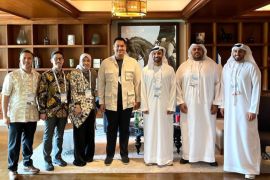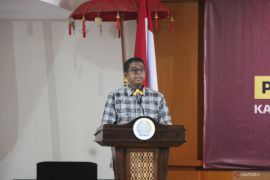New Magazine Provides an In-Depth Look at the Key Issues.
SYDNEY, Australia, Nov. 14 (ANTARA/CNW-AsiaNet) --
Economic uncertainty, tax and regulatory reform: faced with these complex challenges, tax directors need to take forward-thinking approaches to re-designing their operations and re-shaping their long-term strategies in response.
These challenges came into focus today at the 2011 KPMG Asia Pacific Summit in Sydney, Australia, and through a new magazine entitled Future Focus: Tax and Transformation in Asia Pacific's New Business Reality.
Future Focus and the Summit explore how companies doing business in the Asia Pacific region need to examine their tax functions and make transformation and innovation their highest priorities to cope with the increased complexities and rapid development the area has seen.
"From transfer pricing audits, to short-term business travelers, to challenges of offshore holding structures, tax authorities are looking at taxpayers' cross-border activities to shore-up their government's finances and prevent revenue leakage," says Warrick Cleine KPMG's Head of Tax for Asia Pacific. "Businesses in the region are increasingly challenged to keep pace with the speed and complexity of change."
The magazine, developed by KPMG's senior tax professionals, identifies how Asia Pacific companies now need to cope with diverse transfer pricing regimes at varying stages of development, from the mature markets of Japan and Australia, to the less developed regimes of South East Asian countries like Malaysia, Indonesia and Vietnam.
Mr. Cleine comments, "These differences can frustrate efforts to establish consistent company-wide transfer pricing policies. Dealing with newer regimes can also be risky. Even though a company's transfer prices may be sound, the tax authority's field team, particularly in Asia's newer markets, may lack technical experience, which can complicate audits and create disputes."
The Asia Pacific region is already seeing higher levels of scrutiny over transfer prices. In China, for example, although the overall number of cases has remained similar over the past five years, the average value of each adjustment has risen rapidly, so that the total value of adjustments has increased 354 percent (from less than RMB500 million in 2005 to over RMB2 billion in 2009).
According to KPMG tax professionals, there are signs that this trend will accelerate. The increase in transfer pricing regulations within the Asia Pacific region and the corresponding documentation has provided tax authorities with a wealth of data they can use to select audit targets. Thanks to database technology, tax authorities are able to use this information to target industries, groups or even companies with abnormal results and thus focus their search on transactions within these areas.
Future Focus also discusses how businesses in the region need to plan for indirect tax changes and notes how Oceania's average VAT/GST rate rose from 12 percent in 2010 to 12.5 percent in 2011 and the average rate in Asia rose from 11.64 percent in 2010 to 11.93 percent in 2011.
"Businesses in the Asia Pacific region should keep the coming indirect tax changes in mind in their strategic planning," says Mr. Cleine. "For example, they should be sure to accommodate new and changing GST/VAT rates when negotiating long-term contracts with suppliers and when implementing new IT systems. They should also make sure their business has the right mix of income tax and GST/VAT management resources in place."
Planning and preparedness to manage tax risk management are further highlighted in the magazine and discussions about Japan's earthquake in March 2011 and its aftermath that shows the importance of having a robust system in place for tracking and planning employee travel. Emergencies like these can strike without warning, creating a need to move employees out of the danger zone for uncertain lengths of time or marooning them in a foreign country for longer than intended.
"Whether due to environmental disaster, political unrest or other emergency, such moves can cause the same tax exposures as other employee travel," says Mr. Cleine. "In fact, these situations could entail even more risk, for example, when the relocation of key decision-makers from one country to another constitutes a shift in business functions with transfer pricing or permanent establishment implications. When such events occur, quick access to data about your employees' whereabouts and options for relocating them safely and economically is crucial."
As companies in Asia Pacific countries grow and expand into new markets, their tax teams will need to find ways to cope with complex global issues like these while adding value to their organisations.
Luckily, solutions for many of these issues have already been forged over time and with much difficulty by leading organisations in Europe, North America and around the world.
"Asia Pacific companies can bypass these development phases by adopting systems, processes and technologies that are already proven and tested," says Mr. Cleine. "Through this new magazine and our Summit, KPMG tax professionals provide many tangible ideas that Asia Pacific companies can employ to leap ahead."
More information, including social media conversations from the Summit, is now available on Twitter (http://twitter.com/#!/kpmgglobal) and LinkedIn (http://www.linkedin.com/groups?gid=4064840). Videos and other information - including the magazine Future Focus: Tax and Transformation in Asia Pacific's New Business Reality, can be viewed at www.kpmg.com/taxviews.
Note:
Indirect tax rate averages are current as of October 2011. Oceania and Asia are as described by United Nations definitions.
About KPMG International
KPMG is a global network of professional firms providing Audit, Tax and Advisory services. We have 138,000 outstanding professionals working together to deliver value in 150 countries worldwide. The independent member firms of the KPMG network are affiliated with KPMG International Cooperative ("KPMG International"), a Swiss entity. Each KPMG firm is a legally distinct and separate entity and describes itself as such.
SOURCE: KPMG International
CONTACT: For more information, or to arrange interviews, please contact:
James Bigg
Edelman Public Relations
Tel: +1-416-849-2496
Email: james.bigg@edelman.com/
Editor: PR Wire
Copyright © ANTARA 2011











